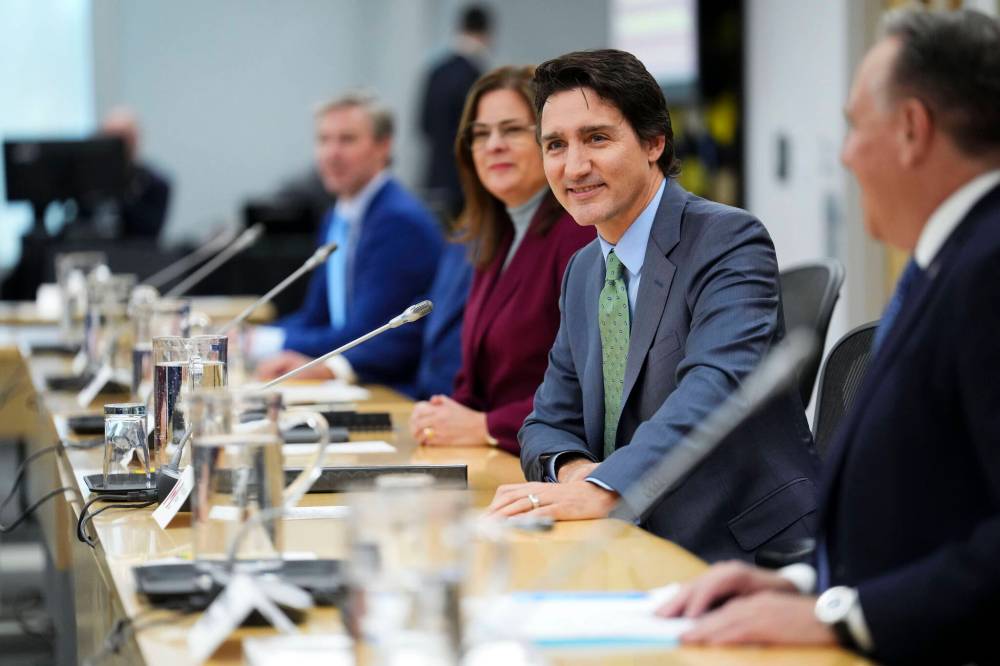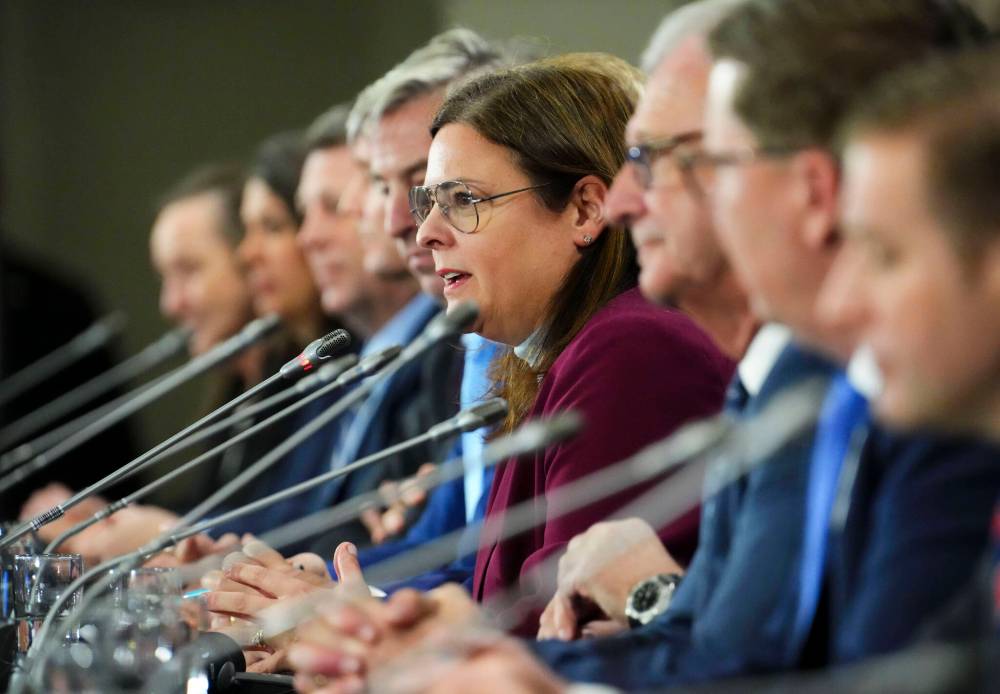Patients lose when Ottawa fails to put conditions on health funding
Read this article for free:
or
Already have an account? Log in here »
To continue reading, please subscribe:
Monthly Digital Subscription
$0 for the first 4 weeks*
- Enjoy unlimited reading on winnipegfreepress.com
- Read the E-Edition, our digital replica newspaper
- Access News Break, our award-winning app
- Play interactive puzzles
*No charge for 4 weeks then price increases to the regular rate of $19.00 plus GST every four weeks. Offer available to new and qualified returning subscribers only. Cancel any time.
Monthly Digital Subscription
$4.75/week*
- Enjoy unlimited reading on winnipegfreepress.com
- Read the E-Edition, our digital replica newspaper
- Access News Break, our award-winning app
- Play interactive puzzles
*Billed as $19 plus GST every four weeks. Cancel any time.
To continue reading, please subscribe:
Add Free Press access to your Brandon Sun subscription for only an additional
$1 for the first 4 weeks*
*Your next subscription payment will increase by $1.00 and you will be charged $16.99 plus GST for four weeks. After four weeks, your payment will increase to $23.99 plus GST every four weeks.
Read unlimited articles for free today:
or
Already have an account? Log in here »
Hey there, time traveller!
This article was published 10/02/2023 (1031 days ago), so information in it may no longer be current.
Canada’s premiers would have you believe the biggest problem with the latest health funding offer from Ottawa is a shortage of dollars.
With respect to the premiers, the biggest problem is a shortage of strings.
Despite broad calls for greater transparency and accountability, the latest offer from Prime Minister Justin Trudeau does not make nearly enough demands on the provinces to show how and where they spend the billions they get from Ottawa.
Although some provinces do better than others, all provinces suffer from poor performance and standards in health care.

Waiting lists for all services are way too long. There aren’t enough critical-care beds or home-care support. Long-term care remains a patchwork of largely inadequate standards.
Meanwhile, reforms and innovations that could make the system operate more efficiently, with better outcomes, are largely ignored. Physicians face too much paperwork, far too many unnecessary tests and diagnostic procedures are being performed, and the management of health data remains stuck in the digital stone age.
In the view of the Council of the Federation, the organization that represents provincial and territorial first ministers, the cause of this poor performance is simple: Ottawa has not been carrying its fair share of total health spending. They have asked Trudeau to increase annual health transfer payments by $28 billion.
Trudeau wouldn’t go there. The offer tabled with the premiers this week involves $46.2 billion in new money to the provinces over the next 10 years. Some of that money will come from increases to the annual health transfer payments, while other money will flow in bilateral deals with individual provinces or be targeted to specific goals such as hourly wage increases for health workers.
The premiers’ response? The full verdict won’t be delivered until Monday, but just about every premier, including Manitoba’s Heather Stefanson who is chair of the council this year, have said it’s not enough.
Over the last six years, Manitoba has received the largest year-over-year increases in federal transfer payments… Instead of shoring up health care, the PC government cut taxes by more than $1.3 billion annually.
While that may be true — it is impossible to define what is “enough” funding for health care — observers outside government are concerned this deal allows the provinces to go forward with few demands from Ottawa on how they spend the money. They remain masters of their own health-care fate, permitted by Trudeau’s latest offer to continue to offer services without even a modicum of accountability.
Trudeau’s failure to attach conditions to his offer is problematic because, based solely on their performance to date, the provinces lost the moral authority to do whatever they want a long time ago.
One need only look at Manitoba to see the danger of condition-free funding from Ottawa.
Over the last six years, Manitoba has received the largest year-over-year increases in federal transfer payments. Some of that is due to the fact Manitoba is a net beneficiary of equalization support which, it should be said, is partly intended to ensure this province is able to provide a national standard of health care.

In 2023-24, Manitoba will receive $5.1 billion in federal transfers, including $1.6 billion in health transfers and $2.9 billion in equalization. That is $1.6 billion more than the PC government got in 2016-17, during its first year in power. Over the last four years, Manitoba has received an average transfer increase of $300 million.
What did the Tories do with all that money? Better home care? More critical-care beds? Recruitment of more doctors and nurses?
Instead of shoring up health care, the PC government cut taxes by more than $1.3 billion annually.
Although Manitoba is not alone in doing this, the PC government’s misuse of federal transfers to effectively fund tax cuts certainly cries out for greater accountability. Lamentably, that accountability will not come with Trudeau’s latest offer.
The key to getting better value from health-care dollars is the creation of national standards and full insight into how and where the provinces spend federal funding.
There is, tucked in the fine print, some targeted money to improve information systems, which could open the door to better reporting and, thus, transparency. But it falls well short of what is needed to improve overall accountability.
National data is woefully inadequate on health-care outcomes and practices. The national system relies solely on the Canadian Institute for Health Information (CIHI), a federal agency that seeks and reports on provincial health metrics.
News organizations lustily report these numbers as if they are true national snapshots of health-care outcomes. But CIHI gives only a partial picture because provinces use different IT systems to oversee health systems, and some even refuse to provide certain data.
Better national health data can show us quickly where progress is being made and allow best practices to be shared and applied across the country.
The key to getting better value from health-care dollars is the creation of national standards and full insight into how and where the provinces spend federal funding. In order to create those national standards, the prime minister needs to make full, transparent reporting of health data a requirement to access federal funding.
Just doling out more money, with no strings attached, will only make the health system more costly, not more effective.
dan.lett@winnipegfreepress.com

Dan Lett is a columnist for the Free Press, providing opinion and commentary on politics in Winnipeg and beyond. Born and raised in Toronto, Dan joined the Free Press in 1986. Read more about Dan.
Dan’s columns are built on facts and reactions, but offer his personal views through arguments and analysis. The Free Press’ editing team reviews Dan’s columns before they are posted online or published in print — part of the our tradition, since 1872, of producing reliable independent journalism. Read more about Free Press’s history and mandate, and learn how our newsroom operates.
Our newsroom depends on a growing audience of readers to power our journalism. If you are not a paid reader, please consider becoming a subscriber.
Our newsroom depends on its audience of readers to power our journalism. Thank you for your support.











